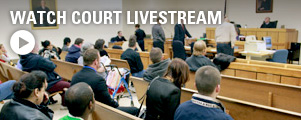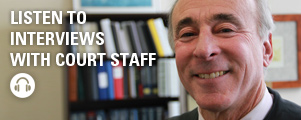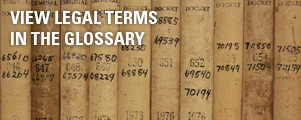The Archiving Issue
by Joe Spurr and Val Wang
At 4 p.m. on Friday, April 29, three days before the announced OpenCourt launch on Monday, May 2, we received a letter on official letterhead from Michael Morrissey, the Norfolk County District Attorney, with a request to prevent public access to our video archives.
The D.A. had concerns the footage would “taint the jury pool and create potential appellate issues.”
When the project launched on May 2, the D.A’s office, often with the defense bar, filed a motion [pdf] to the sitting judge to stay the archives in at least three cases, all of which were rejected.
The letter and the motions came as a great surprise to us, since we have for the past four months met with all stakeholders of the court, including the District Attorney, to ensure we implement this groundbreaking pilot project responsibly and respectfully.
While we will continue to record sessions, we have voluntarily decided to suspend posting the archives until sometime after May 18, 2011, as we try to work out a practical solution to the concerns raised by the District Attorney. Currently, the only archive we are making available is from the first day of coverage, Monday, May 2.
Openness
The guiding principle behind OpenCourt is that justice is to be administered in public. Fewer people have time to go down to the courthouse, and news organizations no longer have the resources to keep an eye on the court. Digital technology can help bridge that gap. Making the archive public is an essential part of that mission.
We are entering a new world. Digital technology and social media are changing how we view privacy, public records, and the permanence of what used to be ephemeral. We believe this is the future and that news media and the court system need to work together to find a way to ensure the public has access to public proceedings. This project represents a safe means to discover thoughtful practices for the coming inevitability of greater access. Of course, while doing so, we remain committed to protect the rights of defendants, victims, and witnesses.
We have been transparent about our process of working with stakeholders to craft the guidelines.
After an open meeting at the court on December 15, 2010, we held local working group meetings monthly in January, February and March. These were all attended by First Justice Mark Coven, court clerks, representatives of the Quincy and Norfolk County bars, public defenders, members of the D.A.’s office, and domestic violence advocates. We wanted to ensure that we heard the perspectives of all stakeholders well in advance of the time we started to stream. We wrote publicly about several of these meetings.
Additionally, in April we held one open session to test the ranges of courtroom microphones, and three training sessions: for court staff, the bar, and members of the DA’s office. At the training session we explained how the project would work, what kinds of cases could not legally be shot and streamed, and how to motion to the judge to shut off the livestream if a potentially sensitive case should arise. We gave everyone the opportunity to see our court setup and ask any questions.
We also held two advisory board meetings at the Supreme Judicial Court in Boston, one in February and one in April.
Archiving was one of the main topics at all of these meetings. The notion to publicly archive and to allow access to the files was in line with our goal of increasing government transparency, whereas to restrict access to the archives would replicate the “private by obscurity” standard which is the current state of affairs.
We brought up the question at our first advisory board meeting and openly discussed posting the archives online. We were explicit about the fact that we intended for the recordings to be archived online and freely available to the public. It should be noted that no one from the D.A.’s office was at this first meeting, as we were still in the process of building the advisory board.
Because we had convened this series of meetings, we understood that all stakeholders knew we were not only recording the proceedings but archiving them online.
What now?
We have collected the footage as an independent news organization and we believe providing open access to the archives is an essential part of our pilot project. But we also want to continue to listen to the concerns of the stakeholders at the court.
We have convened a working group charged with coming up with practical solutions.
If you have suggestions on responsible ways to make the archives public, please post your ideas in the comment section below.
We will keep you updated on the progress of this issue.












is it because court officers used unneccesary force on michael spaur are these the things they dont want us to see. I believe the video should be public.people need to see what is really going on.The fact that someone owes Quincy Court money and misses an appointment is that what the tax payers of quincy are paying these court officers to do.its like legal leg breaking.if you dont pay up( although unemployed with a family)this is what will happen to you.
I just wanted to say, this is a great idea. I am very idealistic about our republic/democracy, and I think that having proceedings open to the public can only put everyone on their best behavior- defendants, victims, and staff- because their actions are subject to the scrutiny of society.
On the subject of archiving, I believe that you should allow archiving for a limited period of time. This limited timeframe would allow the public to review recent proceedings and relevant cases in their communities, allow for proper reporting, while also preventing punishment beyond sentencing. For example, it might be unfair to post a defendant’s video beyond the limits of their sentence, as future employers and social contacts may judge them inequitably with their peers.